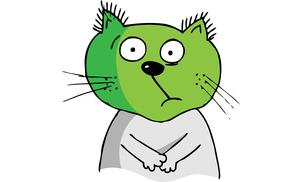 Is your cat throwing up undigested food, hair, or other materials? Throwing up, more formally known as vomiting, is a discharge of stomach contents through the mouth.
Is your cat throwing up undigested food, hair, or other materials? Throwing up, more formally known as vomiting, is a discharge of stomach contents through the mouth.
Vomiting in cats is very serious, and there are few occasions when you can identify and treat the cause by yourself. In this article, you will learn the most common causes of vomiting in cats and in which cases you should visit a veterinarian.
- Medical causes. Even though most of the causes listed below could also be described as “medical,” we list this as a separate entry to stress that many situations require extensive diagnosis and immediate veterinary assistance. IMPORTANT: If this article does not give you an immediate clue as to what is causing your cat to throw up, and if your cat is vomiting consistently (twice or more in the past couple of days), is showing other signs such as lethargy or diarrhea, or is throwing up blood, seek veterinary assistance immediately.
- Internal parasites. Indoor cats can get parasites, too. Worms often cause vomiting in cats. If your cat has worms, you may also observe signs such as diarrhea, blood in the stools, swollen abdomen, and others. In any case, it’s not a bad idea to give your cat worm prevention medicine according to your veterinarian’s instructions.
- Foreign body. If an item does not pass through your cat’s digestive tract, it must come back where it came from. This is how your cat’s body processes ingested foreign bodies. Cats are curious animals, and they commonly ingest small objects, such as thread, rubber bands, wool, and small toys and balls. In some cases, cats do get rid of ingested objects by throwing them up. However, sometimes cats may be unable to bring the object back up, and they will keep vomiting with regular frequency. In such cases, you must visit your veterinarian immediately for investigation, and be prepared for the fact that your cat may need surgery.
-

New food introductions may cause digestive upset in cats. New food introduced. New food introductions are often the number one reason why cats throw up after eating, and it has nothing to do with the quality of the food. The explanation is simple: your cat’s gut contains countless numbers of bacteria that assist in digestion. If the new food contains an ingredient not present in your cat’s previous diet, his gut will also contain a very small amount of bacteria responsible for digestion of that specific ingredient. And, if the body cannot process something, it tries to get rid of it – along with the stomach contents. In many cases, a cat throws up undigested food. The solution is also simple: introduce your cat’s new food gradually.
- Food intolerance and food allergy. These are not the same, but they can have similar signs and symptoms. The most common signs and symptoms are diarrhea, lethargy, pain, and vomiting after eating. With food intolerance, you will most likely need to find out which ingredient your cat’s body cannot tolerate. Blood tests are available for food allergens, but their accuracy is still under discussion, as false positive and false negative results are possible. You can also try choosing a cat food with few ingredients, checking your cat’s reaction to it, and then choosing another food with different ingredients and checking the cat’s reaction again. This process of elimination will help you determine your cat’s tolerance of certain ingredients. Since allergies can be harmful to your cat’s health and life, close veterinarian guidance is necessary throughout this process. As you find a food that your cat eats without throwing up, it’s wise to continue seeking acceptable foods rather than sticking with just one option. It’s better to have alternatives when you have a cat that is sensitive or allergic to certain foods. Good choices for allergic or intolerant cats are hypoallergenic commercial diets or home-made diets. Be sure to discuss your approach with your veterinarian.

- Toxicity. Ingesting toxic substances usually causes diarrhea and/or vomiting. The most common causes of toxicity-related vomiting are food poisoning (spoiled food), plant poisoning, and ingestion of chemical substances such as household chemicals, rat poison, or antifreeze. If you suspect that your cat may have ingested a harmful substance, head to an emergency veterinarian ASAP.
- Hairballs. As your cat grooms himself, he ingests this dead hair. This hair accumulates in his digestive system and is coughed up as a hairball. You will identify it if the vomit contains a cigar-shaped lump of hair. It’s not easy to eliminate hairballs entirely, but you can reduce their occurrence by regularly brushing your cat, providing a wet diet, and increasing your cat’s activity. Find out about hairball prevention in cats here.
- Reaction to medication. If your cat is on medication, check whether vomiting is mentioned as a possible side effect. Call your veterinarian who prescribed the medicine to further discuss the medication’s use.
Remember, if you cannot instantly identify a cause, or if your cat is vomiting repeatedly, visit your veterinarian immediately.
